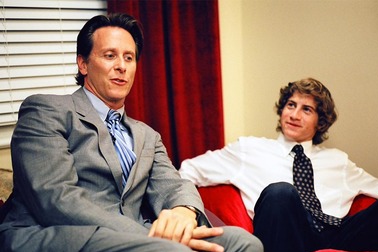Out on DVD this month is a diverse group of films featuring guys behaving badly. The politically themed “Choose Connor” is an outstanding drama about obtaining wisdom. In contrast, “Whirlwind” shows how a “frenemy” infiltrates and disrupts a tight-knit group of gay men. Rounding out the releases is the black comedy “Watch Out,” about a man who will say or do anything to be left alone.
“Choose Connor” is a shrewd and very savvy election-themed drama about the loss of youth and the corruption of idealism. The film was written by the perspicacious actor-turned-director Luke Eberl, who was 17 at the time; he directed the film at 21. When 15-year-old Owen (Alex Linz) meets local Congressman Lawrence Connor (Steven Weber, “Jeffrey”), he questions his representative’s contradictory support for both an environmental bill and a new light-rail system. Connor is impressed by the teenager’s knowledge of the issues, and soon hires him to be his “youth campaign spokesman.” As the ambitious Owen becomes involved in the Connor campaign, he befriends Caleb (Escher Holloway), Connor’s queer nephew who, like the congressman, may have an ulterior motive.
Significantly, the film treats Caleb’s homosexuality with subtlety, addressing it only when dramatically necessary. While the queer young man is intensely sexual — undressing in front of Owen, wrestling with him, hugging him or placing his hand on Owen’s heart — the push-pull sexual undercurrent between the boys is intriguing, and keeps the audience guessing what is really going on between these characters. “Choose Connor,” which is deliberately set in an unnamed place (Connor’s party affiliation is also never mentioned), keeps viewers off-guard almost throughout the film. A speech Connor makes about working the system to his advantage is mesmerizing, no less so because Weber is sitting in a beanbag chair at the time. However, as the characters’ various secrets and lies are revealed, Owen is forced to confront issues of integrity that may not be so easily resolved. The beauty of the film is not only that Eberl is clever — and ambiguous — enough to leave audiences to choose how to interpret the characters’ actions, but that he provides some interesting, albeit coded, messages about the difference between one’s public and private face that should resonate with the gay community. “Choose Connor” is a stunning debut.
A little ambiguity would have aided the watchable though wholly undemanding drama “Whirlwind” immensely. The film concerns Drake (David Rudd), a stranger who ingratiates himself with five gay friends in an effort to undermine them and their relationships. The core group of “witty, urbane” (yawn) New Yorkers consists of uninspired archetypes — the lothario, the wise man mourning his late lover, the insecure one and the couple looking to move in together. One by one, they are “seduced” by Drake — or shun him. “Whirlwind” falters because it never makes its villain particularly alluring. Furthermore, while Drake’s motives for his behavior are obtuse, it’s obvious he is up to no good. Yet the film is really harmed by the attractive cast’s stiff performances and by director Richard LeMay’s absolute lack of style. Shooting everyone and everything in close-up only emphasizes the film’s ultra-low budget, which will also prompt viewers to focus more on the quality of the film than the characters or what they are doing.
“Watch Out” is out filmmaker Steve Balderson’s black comedy about Jonathan Barrows (openly gay Matt Riddlehoover), a self-described “androphobe” — he hates men and women, finding neither gender sexually desirable. In fact, Jonathan loves only himself, even declaring himself “the pinnacle of magnificence.” Yet while several characters compare him to Jude Law, Riddlehoover is more like a poor man’s Ryan Reynolds. The actor plays this arrogant, auto-sexual character in a manner best described as bold — that is, he gleefully sports an erection while masturbating to climax in one scene. Viewers who appreciate Riddlehoover will appreciate “Watch Out.” For anyone else, the title is its own warning.
The film opens in the manner of an early John Waters’ comedy, in which Jonathan’s parents hire a prostitute to get him deflowered and cheer him on during sex. It is meant to be funny and/or outrageous, and it is awkwardly amusing. In contrast, scenes of a woman claiming to dye her ass hair patriotic colors and a superfluous sequence of a man fingering his cousin just try too hard without the humorous payoff. This is not to say the film is entirely without laughs. There are some droll lines in which Jonathan dresses down the various men or women who are smitten with him. And a TV game show called “Celebrity Abortions” might get viewers who enjoy the film’s dark humor chuckling. But “Watch Out” squirms to find the right tone. In trying to be funny and/or shocking, it ends up being neither. When the film segues from outrageous behavior to downright nastiness in its second act, it goes too far over the top. As Jonathan exacts vicious and violent revenge upon various men and women — torturing them in various unpleasant and unconvincing ways — “Watch Out” proves that nothing this excessive succeeds.
